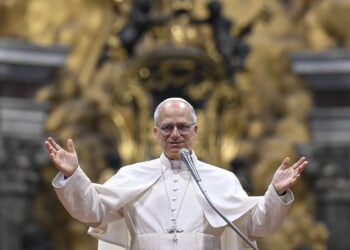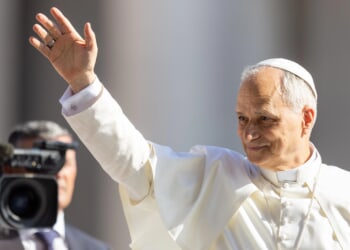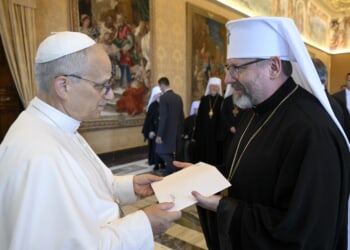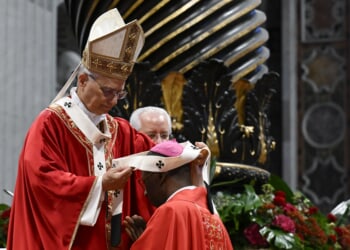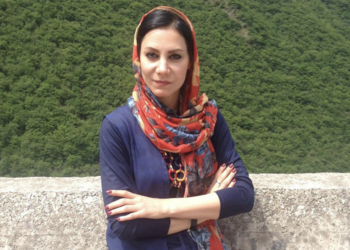Washington, D.C. Newsroom, Jul 7, 2025 /
17:51 pm
Allies of the new Syrian government and other non-state actors have continued violence and discrimination against Christians, Druze, and Shia Muslims, according to a new report from the U.S. Commission on International Religious Freedom (USCIRF).
Syrian rebels, many of whom were affiliated with Hay’at Tahrir al-Sham (HTS), toppled former Syrian President Bashar al-Assad’s regime in late 2024. The report notes that HTS members, many of whom were foreign fighters, engaged in mass killings and other forms of persecution against religious minorities during the overthrow of Assad and have continued violations after taking control of the government.
Syria’s new president, Ahmed al-Sharaa, commanded HTS during the revolution. He was also previously a member of al-Qaeda. In addition to HTS, the report also noted that members of Turkish-backed political opposition and militias (TSOs) and other organizations that engaged in mass killings and religious liberty violations have been welcomed into high-ranking positions in the new Syrian government.
Despite these developments, the new Syrian government has vowed to protect religious liberty as it sets up its new government. U.S. President Donald Trump’s administration has sought to work with the new leadership and has lifted sanctions and removed HTS’ designation as a terrorist organization.
The USCIRF is encouraging the Trump administration to impose conditions on sanction removals that require improvements in religious liberty. The report also encourages the U.S. government to impose targeted sanctions on people and organizations that continue violations of religious liberty.
USCIRF Commissioner Mohamed Elsanousi told CNA that the commission’s primary concern for Syria’s Christians and other religious minorities is “that the transitional authorities’ actual policies and actions match their claims of supporting a religiously inclusive future for the country.”
“The U.S. administration must condition its lifting of sanctions with clear measures so that the emerging government fully abandons its extremist past, extends equal protection to all religious minorities, and enshrines comprehensive religious freedom into Syria’s laws and institutions,” Elsanousi said.
Religious persecution and killings
The most egregious violence after the new government took control was waged against Alawite Muslims — a Shia sect to which Assad and many of his allies belonged — and against Druze — an Abrahamic religion that is separate from Islam, Christianity, and Judaism.
According to the report, unidentified rebels burned the homes of civilian Alawites in Latakia and waged an arson attack against an Alawite shrine in Aleppo last December. It also notes that men who may have been affiliated with the new government executed Alawites and members of the Twelver Shia sect in the Hama province.
The report notes in January and February, HTS loyalists conducted “door-to-door interrogations and select executions” of Alawite Muslims around the Mediterranean coast. In March, the report adds, “the murders escalated to full-blown sectarian massacres” of Alawites in Latakia and Tartus based on allegations of “pro-Assad remnants.”
“Tallies put the confirmed death toll at between 1,700 and 2,246, with the caveat that the actual numbers might be much higher,” the report states.
The report references additional reports of civilian massacres of Alawites “with no known links to the Assad regime” during that time frame. It states that persecutions against Alawites seem to have decreased since March but that as recently as May, there were reports of fighters who may have been affiliated with the government kidnapping Alawites.
Additionally, “a new wave of killings” against Druze began in April, according to the report. This includes “militant Islamist” supporters of the new government killing 134 people in a suburb of Damascus that month.
In March, Syriac Orthodox Christians who lived near the anti-Alawite violence reported that the Christian death toll was “three people,” but other persecutions against Christians took place.
“Islamist militia members regularly intimidated and taunted Christians at checkpoints and looted the homes of Christians with no known links to the Assad regime,” the report states.
(Story continues below)
Subscribe to our daily newsletter
The report notes that the new government has retained many HTS fighters, including “the most militant violators of religious freedom during the Syrian civil war,” within the military. People who are associated with al-Qaeda and the Islamic State of Iraq and Syria (ISIS) hold high positions in the government as well.
For example, intelligence chief Anas Khattab is a former al-Qaeda commander. Abu Hatem Shaqra, who was given a high-level military position, personally participated in executions and other forms of religious persecution “such as recruitment of ISIS members and trafficking of Yazidi women and girls into sexual and domestic slavery,” according to the report.
The future of Syria
In spite of these religious liberty violations, the report notes that the new government has stated its intent to be “inclusive of all Syrians, including religious and ethnic minorities.”
The new government has taken credit for thwarting a planned ISIS attack against a Shia shrine and denounced an ISIS attack that killed 25 worshippers at Mar Elias Greek Orthodox Church in Damascus. It also held a one-day conference to speak with representatives of minority religions.
Alternatively, the new government intends to maintain HTS control for a transitional five-year period. It also notes that after the conference with the minority religions, the government expressed its intent to enshrine Islamic jurisprudence as “the major source of legislation.” After the conference, it notes that the government only expressed its intent to safeguard Christians, Muslims, and Jews, but not other religions.
“The recent bombing of the Mar Elias Greek Orthodox Church in Damascus and massacres earlier this year targeting Alawis in Syria’s coastal areas serve as tragic reminders that these communities remain under serious threat of violence,” Elsanousi said.
Jeff King, the president of International Christian Concern, told CNA the report “exposes the failure of Syria’s transitional government … to protect its Christian minority.”
“This illegitimate regime, composed of rebranded al-Qaeda and ISIS operatives, has done little to curb radical Islam’s campaign to eradicate Christianity in Syria,” he said. King called the bombing of Mar Elias Church in Damascus, which killed 25 Christians, “a stark example” of “ongoing persecution enabled by the government’s inaction or complicity.”
“The Catholic community worldwide must advocate for Syria’s dwindling Christian population, which is now a fraction of its prewar size, and press the international community to reject the legitimacy of this jihadist-led government and demand robust protections for religious minorities,” King emphasized.




